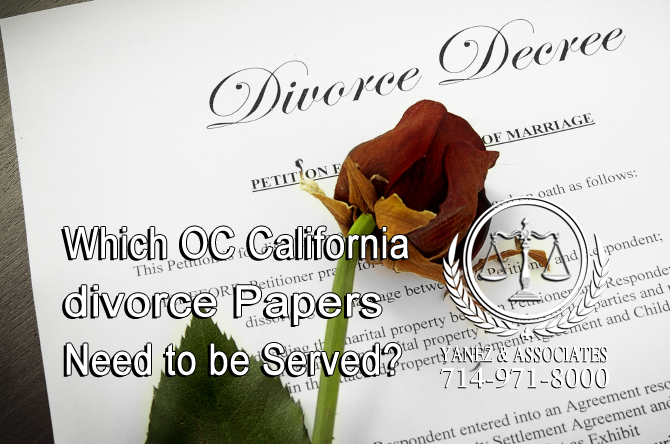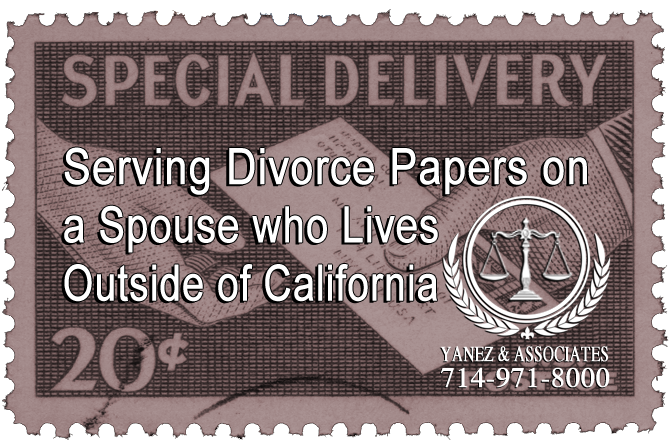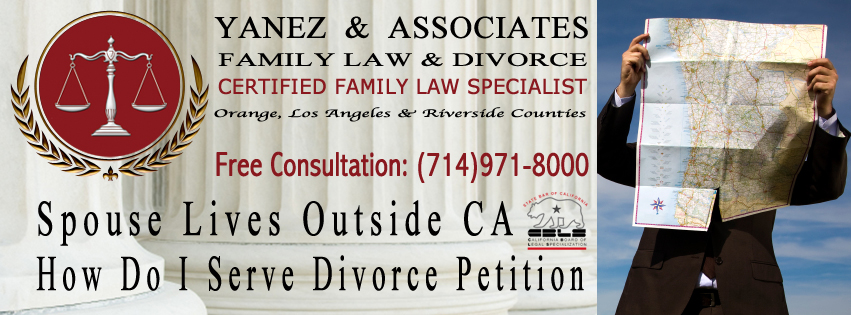What are my options for serving the other party with a copy of the divorce petition if they live in another state or if I am not aware of their whereabouts?
Spouse Lives Outside CA How Do I Serve Divorce Petition: When you decide to file for divorce in California, your spouse or partner has a legal right to be made aware of the divorce proceedings, and you cannot get a divorce without making a reasonable attempt to let the other party know. There are several ways you can go about informing your spouse or partner of the action against them; it is called serving divorce papers.
The method of service that you choose can depend on several factors, including your current relationship with your partner or spouse, his or her whereabouts, or whether or not you know where your spouse or partner currently lives.
Which OC California divorce Papers Need to be Served?

Your spouse has a right to have a copy of all papers filed with the court relating to your divorce and your spouse. You’ll also need to include blank copies of certain forms for your spouse or partner to fill out and return.
• Petition for Dissolution - This form lists basic information about your marriage or registered domestic partnership;
• Summons - This form lists some basic information about regulations that you and your spouse need to follow during the process of your divorce;
• Property Declaration - This form details your property and debts, and may or may not be necessary. If you filed it, serve it;
• Declaration Under Uniform Child Custody Jurisdiction and Enforcement Act - If you have children under 18, you’ll need this form as well;
• You may also need to include forms regarding child custody and child support orders;
• A blank Response form;
• If you are serving your spouse through the mail, include two blank Acknowledgement of Receipt forms.
Service of Divorce Papers in OC California

Usually, when you know how to locate your spouse, you can serve your divorce papers by mail, or you can have them delivered to your spouse or partner in person.
Service by Mail
You may serve your divorce papers by mail two ways. The first works as long as you include a blank form called an Acknowledgement of Receipt, and your spouse signs it and returns it to your divorce attorney. The second is by certified mail, which requires the respondent to sign upon delivery.
Generally, this works well if your spouse or partner either agrees to the divorce or is willing to discuss the proceedings with you.
Personal Service
You may have an individual who is both over the age of 17 and not involved in your divorce hand deliver your divorce papers to your spouse or partner. In most cases, even adult children of the divorcing parties should not be chosen to serve these papers. Often, the petitioning party will hire a process server to serve the divorce papers.
This method can be used if you and your partner or spouse have tension, cannot spend time together, are not on good terms or if your spouse does not want to get a divorce.
However, you may run into issues if your spouse either lives outside of California, or you do not know where your spouse or partner is currently residing.
Serving Divorce Papers on a Spouse who Lives Outside of California

When your spouse lives outside of California, the state allows you to serve your divorce petition in a few different ways, the most common of which are personal service, and service by mail.
When your spouse lives outside of California, the state allows you to serve your divorce petition in a few different ways, the most common of which are personal service, and service by mail.
Acknowledgement and Receipt
This method can be used to serve your spouse or partner whether he or she lives in California our out of state. You’ll need to mail the appropriate documents, in addition to two blank Notice and Acknowledgement of Receipt forms, as well as a stamped and addressed envelope in which the respondent can reply. The respondent needs to sign and date the Acknowledgement of Receipt, and when you receive it, you’ll need to file it with the court, along with a Proof of Service form.
When the respondent has signed and dated the Acknowledgement of Receipt, the service can be labeled complete.
However, if 20 days have passed since you mailed the petition and the respondent has not returned the Notice of Acknowledgement, you may file a motion for the reimbursement of the costs you incurred in filing and mailing the petition.
Certified Mail
This may be the easiest way to serve a spouse, especially if he or she lives outside of California. Upon receipt of the mail, the post office requires the respondent to sign for delivery, which can also be used as assurance that the divorce petition was received by the respondent.
If the delivery was not accepted by the respondent, you may need to try another method of delivery. If the respondent has signed upon delivery, the service can be labeled complete.
Process Server
It may or may not be an easy task to find a friend or relative or to hire a process server to serve your spouse even if he or she lives outside of the State of California. It’s important to look at the details of your case and determine whether this is a viable option for you.
If you choose to use personal service, you need to choose an adult who is at least 18 years old, and who is not involved in your divorce case. In California, this means that the adult cannot be you, your attorney, your spouse or partner, or any children that you have together or individually.
You’ll need to have the person you chose sign an affidavit that states that the papers were served upon the other party. This method can work if your spouse or partner refuses to sign either an Acknowledgement of Receipt or a certified mail delivery.
Make sure to file a Proof of Service with the court.
Substituted Service
Usually substituted service is used if both service by mail and by process server have failed three times. Substituted service allows you to have your process server leave copies of your petition with a third party either at your spouse or partner’s workplace or home, as long as they meet the following requirements.
• The petition must be left with a person who is 18 or older and in charge or has responsibilities at the place of work or business;
• The person serving the petition needs to tell this person generally what the paperwork is for;
• In addition to hand delivering the petition, the server needs to mail a copy of the same petition and all additional paperwork to the address where it was delivered, (either the workplace or home);
• The server needs to fill out a form called the Declaration of Due Diligence, which describes the failed attempts to deliver the petition;
• The Declaration of Due Diligence and the Proof of Service need to be filed together with the court.
Serving California Divorce Papers on a Spouse I Cannot Locate

I am having trouble Serving the California Divorce Papers because I cannot locate my spouse!
If you do not know where your spouse currently lives or works, you cannot locate him or her, the methods listed above may not work. However, you still need to make an attempt to locate your spouse and serve him or her with divorce papers. There is one more method for serving divorce papers, called Service by Publication or Service by Posting. You need permission from the court in order to use this method.
First, you’ll need to file a Motion to Serve by Publication/Posting.
In order to do so, the judge will need to determine that you have already made sufficient efforts to find your spouse and serve him or her, and your efforts have failed. You will need to tell the judge how you attempted to find your spouse and proof that you failed.
If, within 60 days of filing your divorce papers with the court, you have not served your spouse, make sure that you return to the courthouse and request another 60 days.
If you have made all possible efforts to find your spouse, you may file a Motion to Serve by Publication/Posting with the court. You’ll need to include a list of your efforts to find and serve your spouse and how you failed. If the judge approves your request, you can move forward.
Service by Publication or Posting, After Approval from a Judge
Usually, you’ll need to publish your posting once per week for up to three weeks in two different local publications. It is your responsibility to contact your local publications and arrange to post an ad in their classified section.
The judge should give you a legal notice along with your approval to serve your spouse or partner through publication/posting. You’ll need to give the signed notice to the newspaper and have it published.
Orange County Divorce Lawyers
If you are ready to file for divorce, it is in your best interest to contact an attorney. Schedule your free initial consultation today with the OC divorce lawyers at Yanez & Associates.









